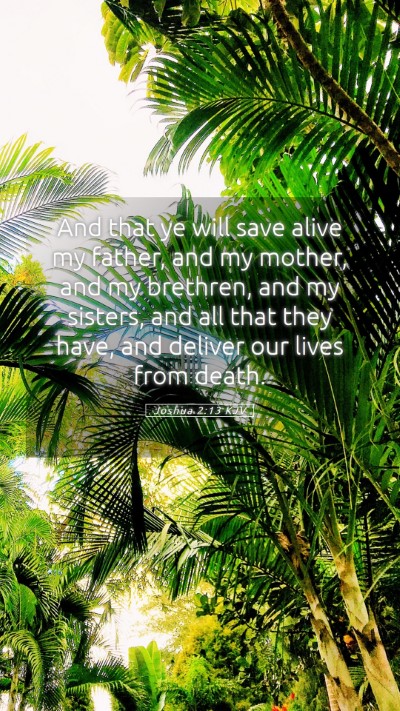Old Testament
Genesis Exodus Leviticus Numbers Deuteronomy Joshua Judges Ruth 1 Samuel 2 Samuel 1 Kings 2 Kings 1 Chronicles 2 Chronicles Ezra Nehemiah Esther Job Psalms Proverbs Ecclesiastes Song of Solomon Isaiah Jeremiah Lamentations Ezekiel Daniel Hosea Joel Amos Obadiah Jonah Micah Nahum Habakkuk Zephaniah Haggai Zechariah MalachiJoshua 2:13 Meaning
What is the meaning of Joshua 2:13?
And that ye will save alive my father, and my mother, and my brethren, and my sisters, and all that they have, and deliver our lives from death.
Joshua 2:13 Bible Verse Meaning
Understanding Joshua 2:13
In Joshua 2:13, we find a pivotal moment in the story of Israel's conquest of Canaan. This verse captures the depth of faith and the significance of God’s protection. For those seeking Bible verse meanings and Bible verse explanations, this passage provides rich insights into themes of trust, deliverance, and the unfolding of divine authority.
Scripture Analysis and Historical Context
Joshua 2:13 states: "And spare my father and my mother and my brothers and my sisters, and all who belong to them, and deliver our lives from death." This declaration comes from Rahab, a Canaanite woman who recognizes the power of the God of Israel and pleads for the safety of her family in light of the impending judgment on Jericho.
Key Elements of the Verse
- Rahab's Faith: Rahab's plea reflects her belief in the God of Israel, contrasting with the general disbelief among the inhabitants of Jericho.
- The Request for Deliverance: Her appeal highlights a universal longing for salvation and protection amidst judgment.
- Family Bonds: The emphasis on saving her family signifies the importance of kinship and collective identity in the ancient world.
Bible Verse Interpretation
According to Matthew Henry, Rahab's faith is a remarkable example of believing God's word over the fear of earthly powers. She embodies the principle that faith can lead to salvation, even from the most unlikely individuals.
Albert Barnes adds that this plea reflects God's promise of mercy to those who demonstrate faith, reinforcing the theme of redemption that permeates Scripture. Rahab's inclusion of her family in her request shows her desire to share in the blessings of God's mercy.
Adam Clarke points out the cultural implications of Rahab's actions, noting that her risky choices stemmed from a deeper understanding of Israel's destiny and a recognition of her own precarious position. It highlights the transformative power of belief that shapes one's identity, even outside the covenant community.
Practical Application
For modern readers engaging in Bible study or seeking Bible study resources, Joshua 2:13 serves as a testament to the enduring relevance of faith and intercession. It calls into question our own commitments to family and faith, urging us to seek deliverance not just for ourselves but for those we love.
How can we apply the lessons from this verse in our daily lives? It prompts us to reflect on the importance of prayer, the nature of our relationships, and the power of faith in the midst of challenges.
Cross References
- Hebrews 11:31 - Rahab's faith is acknowledged in the context of heroes of faith.
- Matthew 1:5 - Rahab is included in the lineage of Jesus, illustrating the theme of redemption.
- Judges 1:25 - The fulfillment of the promise of salvation made to Rahab and her family.
Conclusion
In summary, Joshua 2:13 is rich in Bible verse interpretations and offers profound insight into the nature of God's mercy and the power of human faith. Engaging with this scripture invites Bible study groups to consider its application in today's context, remembering that the God who responded to Rahab's plea is still present, eager to deliver and save those who trust in Him.


